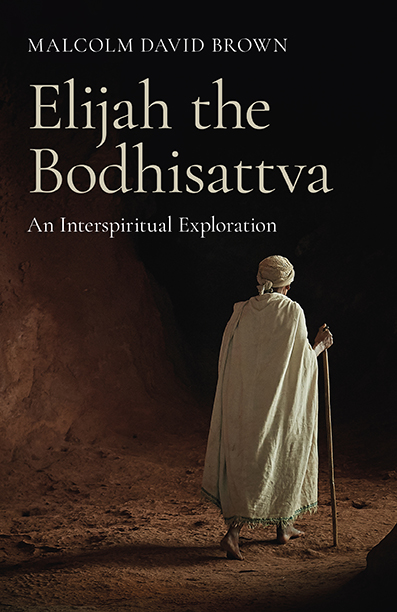Elijah the Bodhisattva
Reading the Bible through Buddhist eyes ... Elijah the Prophet’s journey to enlightenment.

Reading the Bible through Buddhist eyes ... Elijah the Prophet’s journey to enlightenment.
Reading the Bible through Buddhist eyes ... Elijah the Prophet’s journey to enlightenment.
Biblical criticism & interpretation (general), Buddhism (general), Quaker
This is an interspiritual commentary -- largely though not exclusively Buddhist-inspired -- on the life of Elijah as recounted in the Bible. It treats the externals of his life as metaphors for internal mind-states, his story as a labyrinth-like journey toward enlightenment, an unfolding realization of the non-duality of himself and God. Elijah begins with a henotheistic conception of God as a national deity connected to the land of Israel and progresses to a realization of God as the ground of being, being-itself, the God of those who struggle with God, which is the deeper meaning of the name Israel. While the inner dimension is emphasized, there is also a focus on the political dimension of the story, which liberation theologians call God’s preferential option for the poor, and here it is called the politics of anatta -- the core Buddhist principle of not-self.
Click on the circles below to see more reviews
This is an interspiritual commentary -- largely though not exclusively Buddhist-inspired -- on the life of Elijah as recounted in the Bible. It treats the externals of his life as metaphors for internal mind-states, his story as a labyrinth-like journey toward enlightenment, an unfolding realization of the non-duality of himself and God. The forefather of monasticism in the West and one of the great Hebrew prophets, Brown’s prose here seamlessly weaves its way in and around both Christianity and Buddhism, as well other traditions, whilst at the same time never once leaning too hard in one direction over another. In a way that breaks down existential and existing traditional boundaries, the spiritual nature of the book is never far from the author’s thoughts, and that, my friend, is a good thing. In conclusion, books like these can quickly become bogged down in their own inner message, but here, Brown walks us through interspirituality, new monasticism, spiritual practice, comparative theology, the essential interdependence of our contemplative traditions, and even just striving to be a better Christian or Buddhist, as if it were his life’s journey (and maybe it is). ~ Excusive Magazine, Review
Rating: 5 out of 5 stars. Brown describes this book as an interspiritual exploration and it certainly appears so. Inspired by Buddhism he attempts to equate Elijah to the Bodhisattva. I’m not going comment much on this book. I personally believe it isn’t something I could comment on. I do believe that one should read it and discover what Brown has to say for themselves. Being aware that there are certain common threads running through all religions they do not however fully explain Elohim, Israel’s God before which there is none other. The very concept of Henotheism is questionable for a Bible believing Christian. The same is true for a Hebrew who believes on the Torah and Tanakh absolutely for his guiding principles. God being a title can of course be conferred on anyone as those worshipped by our ancestors proves. Thus a Christian would have serious problems appreciating most of the concepts in this commentary. An unwary Christian might even be led astray. Equally one might glean certain concepts from such reflections but would fail to understand fully, the essence that is Elohim and His Way. Likewise equating Elijah to any other spiritual discipline is sadly incongruous. I have given it 5 stars because it has been written with clarity. It is for the reader to decide. ~ Beatrice Vegas (Reviewer) , NetGalley
In a beautiful meditation that exemplifies our interdependence, Malcolm Brown reflects on the life Elijah, a forefather of monasticism in the West and one of the great Hebrew prophets, thru the striking lens of Buddhism and the Bodhisattva. Building a bridge that goes both ways, Brown’s work enriches both Christianity and Buddhism, as well as the other traditions he engages. However, the greatest gifts herein lie for the spiritual practitioner. By placing an emphasis on the spiritual nature of a transformative path, Brown unearths tantalizing Biblical interpretations, with contemplations that roam across our religious traditions. In a world where traditional boundaries between religious traditions are being rapidly worn down in the existential lives of interspiritual practitioners, more books like this are needed—offering deep, respectful, and practice-oriented reflections between and among traditions. As an “unsystematic theology” that makes liberal use of “spiritual imagination,” this book is a gem for anyone interested in interspirituality, new monasticism, spiritual practice, comparative theology, the essential interdependence of our contemplative traditions, or in being a better Christian or Buddhist—or simply a better human being. ~ Rory McEntee, co-author of The New Monasticism: An Interspiritual Manifesto for Contemplative Living
Malcolm Brown employs his wide knowledge of many faith traditions to create a kaleidoscopic interpretation of the Biblical story of Elijah. The prophet is seen in terms of Mahayana Buddhist concepts of nonduality and the Bodhisattva. This imaginative contribution to interfaith exegesis will enlighten some and exasperate others—or perhaps do both! ~ Ross Thompson, author of Buddhist Christianity and The Interfaith Imperative